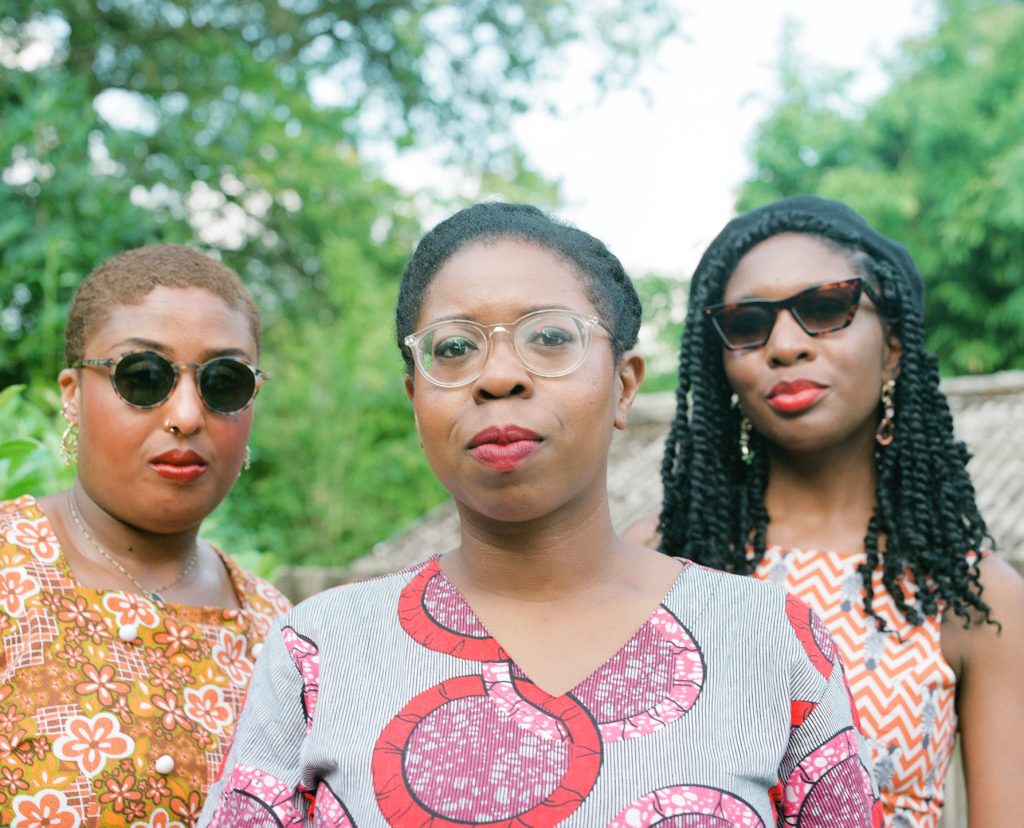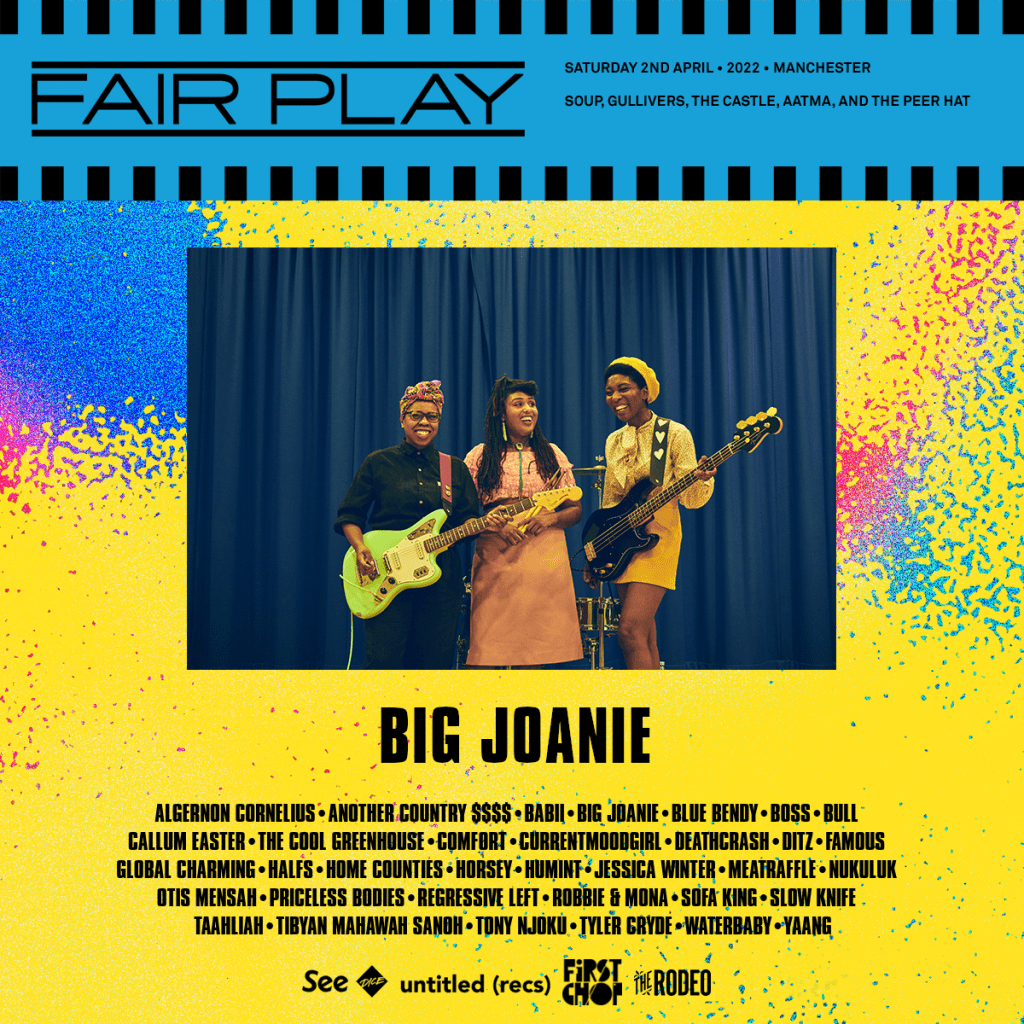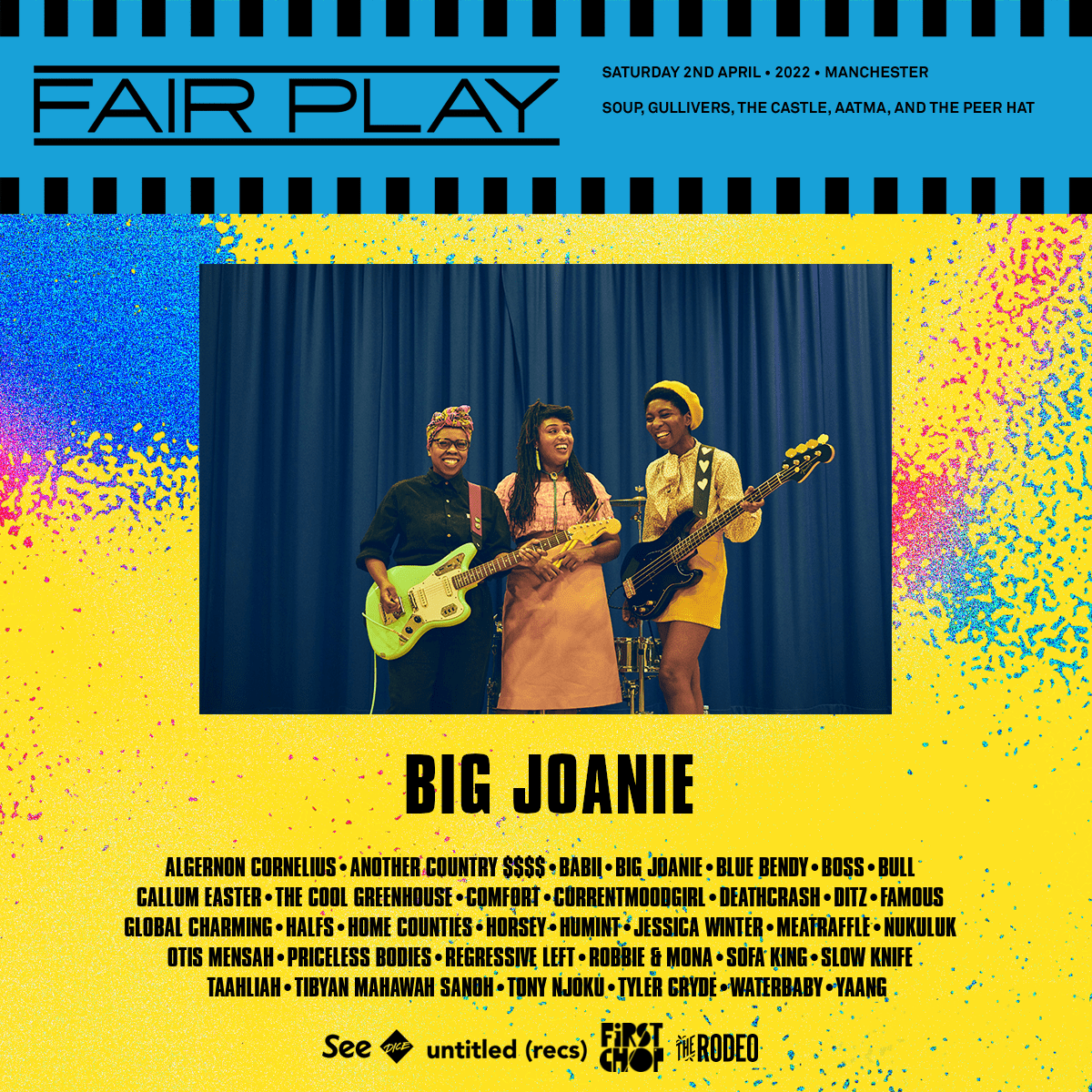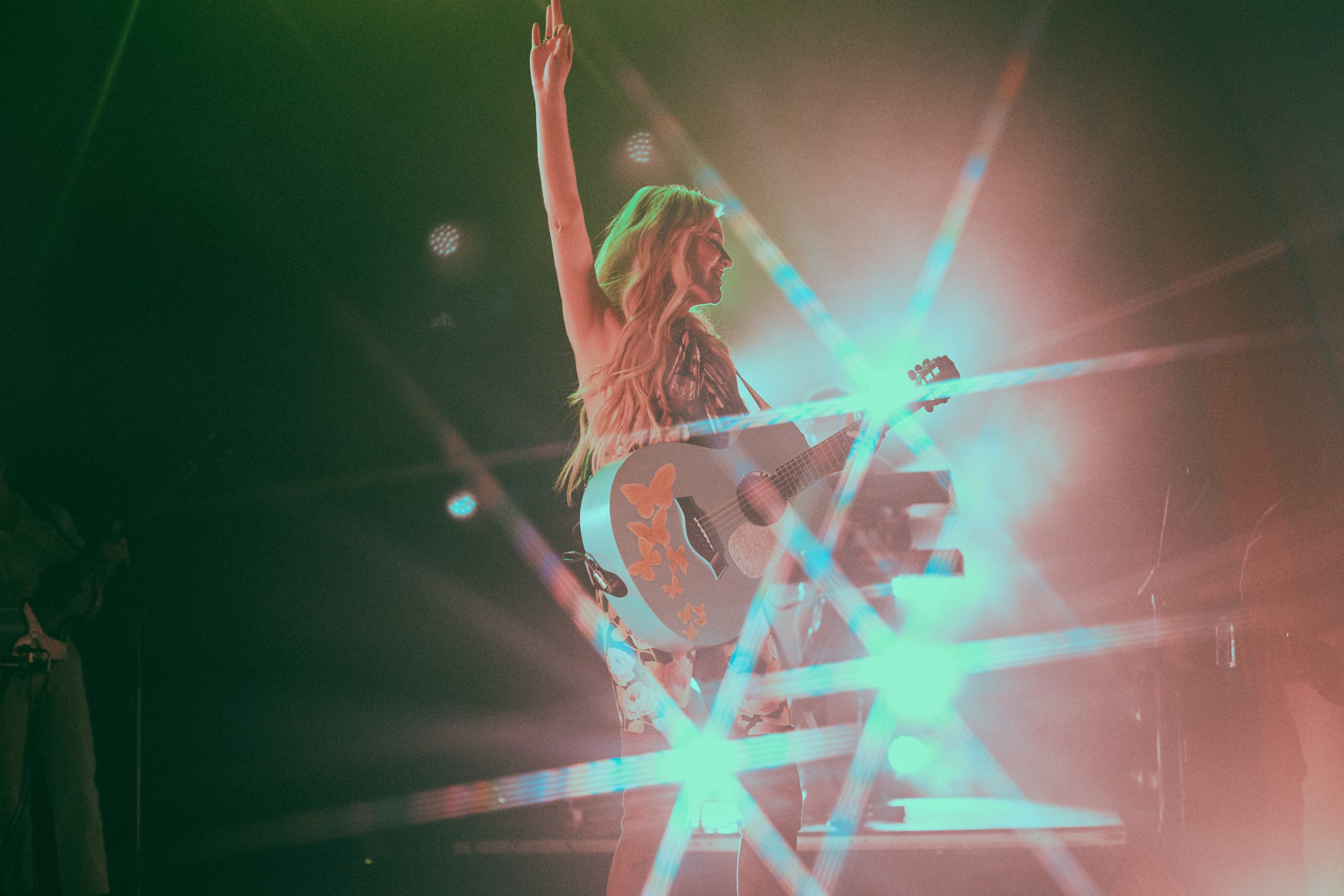Taking their cue from the musicians who pioneered the genre, Big Joanie are the Black feminist sistah punk trio reclaiming space for fellow punks of colour, in what has become a dominantly white, male, and heteronormative space.
If there’s anything Big Joanie have shown since their formation in 2013, it’s that they don’t do anything by half measures. Their debut album, Sistahs (2018), was released under Thurston Moore (Sonic Youth) & Eva Prinz’s label Daydream Library to wide critical acclaim. The band quickly found fans in the likes of Bikini Kill, Sleater-Kinney, and Gossip — all of whom keenly offered them support slots on tour.
Now, fresh off a UK tour supporting IDLES with Jehnny Beth, and about to make a return to Manchester’s Fair Play Festival this April, we caught up with the band’s singer/guitarist Stephanie Phillips and bassist Estella Adeyeri (also of Charmpit) to talk all things punk, live shows, and what to expect from their highly anticipated sophomore record.

It’s fortuitous that we’re chatting on International Women’s Day. Have you been doing anything to mark the occasion?
E: Usually, if I have a bit more time, I like to put together a playlist, as well as sharing as much good content as I can. It’s been really cool seeing other women artists that we follow sharing information about what they’ve been up to, or sharing their releases, as well as catching up on things that I might have missed. It has felt quite celebratory in that way, seeing a lot of art from other women in music or other women who are doing creative things.
S: Sometimes we play gigs around this time but usually it’s a nice day to just reflect and think about important women in your life!
Steff, I’m currently reading your book, Why Solange Matters, having attended the launch in Newcastle. In the book, you explain that Solange describes A Seat at the Table as being her “punk” album, because she was “shaking things up”. I wondered if you could both describe what punk means to you?
S: I think the idea of punk is really important to me. People describe [Big Joanie] in so many different ways; they think that we’re indie or that we’re post-punk. I think punk is really important to what Big Joanie is, and what we stand for. For me, it’s about being DIY, and specifically creating your own culture. When I found out about Riot Grrrl — that kind of 90s, feminist punk — that basically changed everything around for me; it gave me the chance to see that I could make my own culture, I could do things myself and didn’t have to rely on someone else to tell me what the most important aspect of culture was, what was the best way to write a song, or what was the best lyric was. Punk is about having that ability to create, be rebellious and to find your own way through life.
E: Similarly for me, it’s mainly been about community, and my experience of DIY communities. That’s how I got involved with playing in bands. It was always other DIY bands and people within those communities who would give us shows and stuff. It wasn’t big promoters or anything, it was always people who are friends or in other bands who would lend us gear etc. Being in the DIY and volunteer community spaces when I moved back to London in 2015 showed me that you don’t have to stick to the norm in terms of figuring out how to play shows, or how to be in a band, or how to write a song. If you didn’t have what you wanted at hand, you would create it yourself, which I think is kind of what the DIY/punk space is about. For example, Decolonise Fest started because there wasn’t a punk festival for punks of colour, so we created it ourselves in our own community, for our own people.
The Decolonise Fest manifesto vows to rewrite the rules of punk. Could you expand on what it means to be rewriting the rules of punk, as punks of colour?
S: It’s a lot within the culture itself. For so long, punk was described as something very static and rigid; it was for white guys – The Sex Pistols, The Clash, and The Buzzcocks. Looking at punk from a different angle however, you see that there was so much more to it than that really strict narrative we’ve been given. Decolonizing punk and breaking it down is about seeing beyond that white male hegemonic view of music. It’s about looking at the real history of [punk], and the people of colour in the scene at that time. Guitar music developed from a lot of Black music, communities, and cultures. There have been so many interactions with different communities which means that punk is more than just one specific thing. Decolonising Punk is about going back through history.
I think that sometimes people want to write you into the future, but that negates the reality that we’ve always kind of been there. We don’t have to ask for permission to be there in the future. We started [punk] with everyone else and have been there all the same. Knowing that gives you a lot of power to realise that you deserve to be there as much as everyone else.
The first Decolonise Fest took place in 2017; what are you most proud of in what the festival has achieved in that time?
E: I think building a community around it. It’s a festival where people feel comfortable to attend on their own and know that they’re going to meet like-minded people and make friends over the course of the weekend. In the past, we’ve had opening events on a Friday evening, Saturday and Sunday we have talks and workshops and really interactive things daytime, followed by bands in the evening. Obviously, we say it’s a festival by punks of colour for punks of colour; everybody in the organising team is a person of colour, every act you’ll see on stage, and every facilitator for a workshop will be a person of colour. Audience wise it’s open to everyone and we always get a really broad diverse audience, and artists leave happy because they get to play to people the majority of who look like them. We work to make sure it’s an enjoyable experience for the artists in terms of making sure they’re properly looked after and properly compensated. In that sense, we’re proud of being able to centre people of colour where so often we’re not centred, and devalued in wider society.
So Big Joanie have just finished recording their second album. What can you tell us about it? What can you give away?
S: Oo, what can I give away…I think it sounds really different to our first album, is what I’d say.
E: I think it sounds bigger. If that’s any sort of clue. It’s a bit more ambitious than the last record. We’re experimenting more in terms of our set-up for particular songs, and with different instruments that people maybe haven’t heard us play before. But yeah, “big” seems to make sense to me, haha.
Really putting the “big” in Big Joanie?
E: Yeah, we’re putting the “big” in Big Joanie haha.
S: Yeah, we wanted to have a sound that matched our live sound. We recorded Sistahs like a year before it came out, so even in that year, before the album came out, our sound changed. Throughout the last couple of years of touring, our sound has completely changed and got a lot bigger and more dense and aggressive, I think? That’s something that we really wanted to put into the new album. We want to make people feel a bit scared. You don’t want to be liked, I think haha.
You’ve cited people like Kate Bush, PJ Harvey, and FKA twigs as artists you admire and are inspired by because of the way they approach the album as being an entire, complete body of work. I wondered if when you approach the writing of your own albums, whether you go into it with an initial concept, but perhaps key components that you wanted to achieve so that by the end of it you’re like “Yeah, that is the record there.”
S: So our latest album is made up of a lot of songs written across completely different periods. Some songs were written quite a few years ago and developed recently, whereas some songs were written during the pandemic. So there is that kind of claustrophobic vibe, you know, talking about isolation and that feeling of being separated. But I think when we were bringing the songs together, for me, one of the most important feelings that came from it was any feeling of wanting to be safer at home. That was a big idea that I kept trying to link from each song to another. We don’t always start with a big, expansive plan, but it builds along the way, I think. Would you say that, Estella?
E: Yeah, definitely. Having experienced writing and recording the first album, we realised that we weren’t limited to just our own specific instruments; being in the studio there’s almost limitless possibilities. Therefore we were thinking more broadly in terms of instrumentation, songs, and even structure, being a bit more experimental with it all.
It’s as though the claustrophobia, and the dense and compact place we found ourselves in has resulted in quite the opposite.
S: Yeah, because I guess the last couple of years has taken over every aspect of the way we think about things. You couldn’t not have these thoughts about being confined and being restricted. I think we want to find big, big ways to let it out. We don’t want to have our voices dulled in any way. Even if it’s a sad song, it should be a big sad song.
You’ve got a really busy few months ahead with Fair Play Festival in Manchester, SXSW, 6Music Festival, Wide Eyed – to name just a few. What are you most looking forward to about live shows?
S: Yeah, it’s really exciting. I mean, I think it’s just like playing live is fun, because it’s always an opportunity to develop, and kind of find new ways to think about the songs. And it’s just fun to get that validation. You know, we think it sounds cool, but it’s better if someone else thinks it sounds cool.
E: We always have a good crowd in Manchester. It’s always a good atmosphere whenever we play live there so I’m really excited to go back to Fair Play Fest. Definitely over the pandemic, I really missed that audience engagement. Not even just when we’re playing live, but also getting to speak to people afterwards and hearing what’s brought them to the show or hearing what kind of radical things they’re doing in their communities and stuff like that.

You supported IDLES recently, right with Jehnny Beth. Are there any moments or highlights from that tour?
S: That was a really fun tour. I think Newcastle was one of the best shows on that tour. Like, I don’t know what’s going on in Newcastle, but everyone’s full of beans or something, haha. Like really enthusiastic about everything?
E: Yeah, we had our second time DJing at Zerox afterwards, that’s always a great night as well. I think Newcastle just knows how to party and do crazy stuff.
S: I’d move there but it’s too cold, haha.
E: I think the stage invasion on the last night of the tour, where us and Jehnny Beth joined IDLES on stage for their last song on the final night in Glasgow, that was really fun. There were two of us playing bass, me and Dev, I can see Steph and Chardine with an extra drum in the middle of the stage, there was just chaos. Jehnny Beth was stage diving!
That sounds incredible. We’re gonna need to scour the internet for some footage of that. I was going to ask how you wind down after a gig but it sounds like you kind of go the opposite way and turn it up after a gig?
E: I blame IDLES, I think they’re a bad influence haha.
S: Usually we just have a cup of tea, and go to bed. There’s just so much to do when you’re on tour and there’s so much to prepare for!
E: Yeah, I wish people could see the herbal tea I have right now. Which is exactly what I do when we finish playing.
You just announced that you’re playing Grace Jones’ Meltdown in June at Southbank Centre. How did it feel when you first found out that you were playing a lineup curated by Grace Jones?
S: It’s really amazing that she wanted to bring us along for this festival. I’ve been following Meltdown for years and seeing the different people they bring in so it’s amazing to see a Grace Jones created one. I mean, it looks so amazing they’ve got Peaches and Skunk Anansie playing. There’s so many amazing artists, it’s just like a bit surreal to be part of that as well.
E: My sister and I actually got tickets for Skunk Anansie so I was planning to go anyway, so it’s quite nice we ended up being on the bill as well! The idea of Grace Jones even having us on her radar is quite exciting, especially for something we’d be wanting to attend anyway. It’s just really exciting!
Big Joanie play Fair Play Festival in Manchester on 2nd April 2022.


